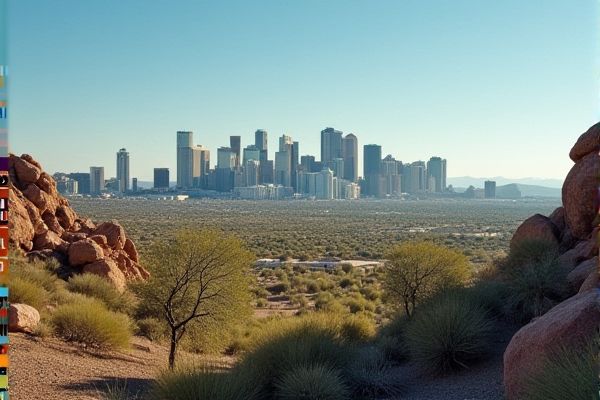
Cost of living in Arizona: Housing prices vary by city. Utilities can be high in summer. Groceries cost slightly above average. Gasoline prices fluctuate frequently. Sales tax varies across counties. Healthcare expenses can be significant. Public transportation is limited. Entertainment costs are reasonable. Car insurance rates are competitive. Education expenses depend on location.
Housing prices vary by city.
Housing prices in Arizona vary significantly by city, with cities like Paradise Valley and Carefree showing the highest typical home values, exceeding $3 million and $1.2 million respectively. In contrast, cities such as Bullhead City and Apache Junction present much lower median home values, around $187,100 and $174,100 respectively. For more insights, you can explore detailed statistics on the Fastest Growing Home Prices in Arizona.
Utilities can be high in summer.
In Arizona, especially during the summer, utility bills can be significantly high, with average electricity bills increasing by over $100 due to increased air conditioning usage. This surge positions Arizona as the state with the highest average summer electricity cost in the nation. To read more about this issue, visit the Phoenix New Times for an in-depth analysis of how these costs impact residents across the state.
Groceries cost slightly above average.
Grocery costs in Arizona are generally slightly above average in some areas but overall remain relatively affordable, with prices about 14.6% lower than the national average, especially for staples like dairy, fresh produce, and meat. However, costs can vary by location, with cities like Tucson and Flagstaff having food costs slightly higher than the national average. For more insights on living expenses in the state, the Cost of Living in Arizona provides a comprehensive overview of how these factors can impact your budget.
Gasoline prices fluctuate frequently.
Gasoline prices in Arizona, particularly in Phoenix, fluctuate frequently due to factors such as the transition from winter to summer fuel blends, supply constraints from pipelines, and increasing demand driven by the state's growing population. Despite recent improvements in pipeline capacity, Arizona's gas prices remain higher than the U.S. average. For more in-depth information, you can visit the Arizona Gasoline Price Update on the Stillwater Associates website.
Sales tax varies across counties.
In Arizona, the Sales Tax rate varies significantly across counties, with the state sales tax being 5.6% and local governments collecting up to an additional 5.3%, resulting in a range from 5.6% to 11.7% depending on the location. For more detailed information on these rates, you can visit the Sales Tax Handbook website.
Healthcare expenses can be significant.
In Arizona, healthcare expenses can be significant, with the average monthly cost of health insurance being $577 and the average yearly cost being $6,924 in 2022, varying by location, income, and other factors. Despite relatively low per-person healthcare costs compared to the national average, many Arizonans face high premiums, out-of-pocket costs, and often delay medical care due to financial constraints. To gain a deeper understanding of these challenges and explore potential solutions, you can visit the Accessing Affordable Care article, which provides valuable insights into the intricacies of health insurance in Arizona.
Public transportation is limited.
Public transportation in Arizona, particularly in Phoenix, is limited and faces significant accessibility challenges. This is especially true for individuals with disabilities, as services like Dial-A-Ride tend to be more expensive. The traditional public transportation systems often do not meet the needs of this community. For more details on the measures being taken or lacking in Phoenix, visit the informative article on AZ Big Media, which delves deeper into the issues surrounding public transport accessibility in the region.
Entertainment costs are reasonable.
Entertainment costs in Arizona can be reasonable, offering various options for budget-friendly enjoyment. One can visit museums at discounted rates, explore the historic town of Tombstone for free, or camp at the Grand Canyon with affordable fees. Furthermore, attending sports games is possible with cheap ticket options starting below $20 per person. These activities make it possible to have fun without breaking the budget.
Car insurance rates are competitive.
Car insurance rates in Arizona are competitive, with companies like Root, Auto-Owners, GEICO, State Farm, and Travelers offering some of the cheapest options. Rates range from $76 to $105 per month for full coverage, depending on the provider and individual driving factors. For more detailed information on finding the best car insurance options, you can visit the Policygenius website.
Education expenses depend on location.
Education expenses in Arizona vary significantly depending on the type of school and location. For instance, public schools are tuition-free, while private schools can cost an average of $9,619 for elementary school and $13,766 for high school, with additional costs influenced by local funding mechanisms such as bonds, overrides, and tax-credit scholarships. For more detailed insights on school choice options, including how these funding factors play into the educational landscape, you can visit the AZ School Choice Guide.
